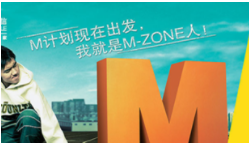

In today’s global marketplace, success depends on appealing to an international clientele. The surge in China’s economy has prompted foreign companies to adjust their brand names for a competitive edge in the Chinese market. Conversely, successful Chinese brands are venturing onto the global stage, necessitating adaptations to their brand names. However, Chinese brands currently face low awareness levels globally. To facilitate expansion into competitive foreign markets, consider employing effective English naming strategies that enhance brand visibility, ensuring a strategic and impactful presence in diverse international markets.
Here is a list of recognized Chinese brands’ English names
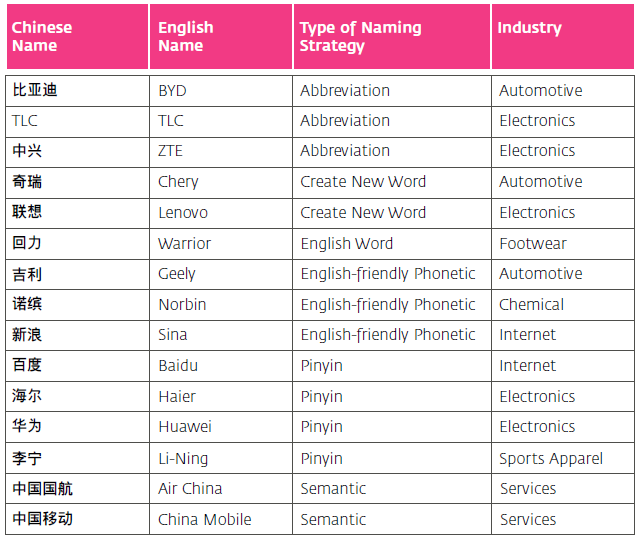
A list of recognized Chinese brands’ English names
From the list, we can see English naming strategy can take on many forms. For the duration of this report, we are going to analyze three time-tested English naming strategies for Chinese brands:
1) Using a direct Pinyin translation that keeps the original phonetics
2) Using a slightly different “English- friendly” phonetic Pinyin name
3) Using abbreviation
Huawei Technologies Co. Ltd. (华为) is a Chinese company specialized in information and communications technology (ICT). It was founded in 1988 with headquarters in Shenzhen. Huawei’s core business is to provide services to telecommunications network operators such as hardware, software and corporate computer networks. Over the past few years, Huawei also entered the consumer cell-phone industry in China and abroad. Before going global, the group was a dominant supplier in China. Huawei’s international conquest came with the adoption of a very competitive pricing policy. In 2010, Huawei’s profit has increased to 23.8 billion RMB (approximately 3.7 billion USD) with products and services in more than 140 countries.
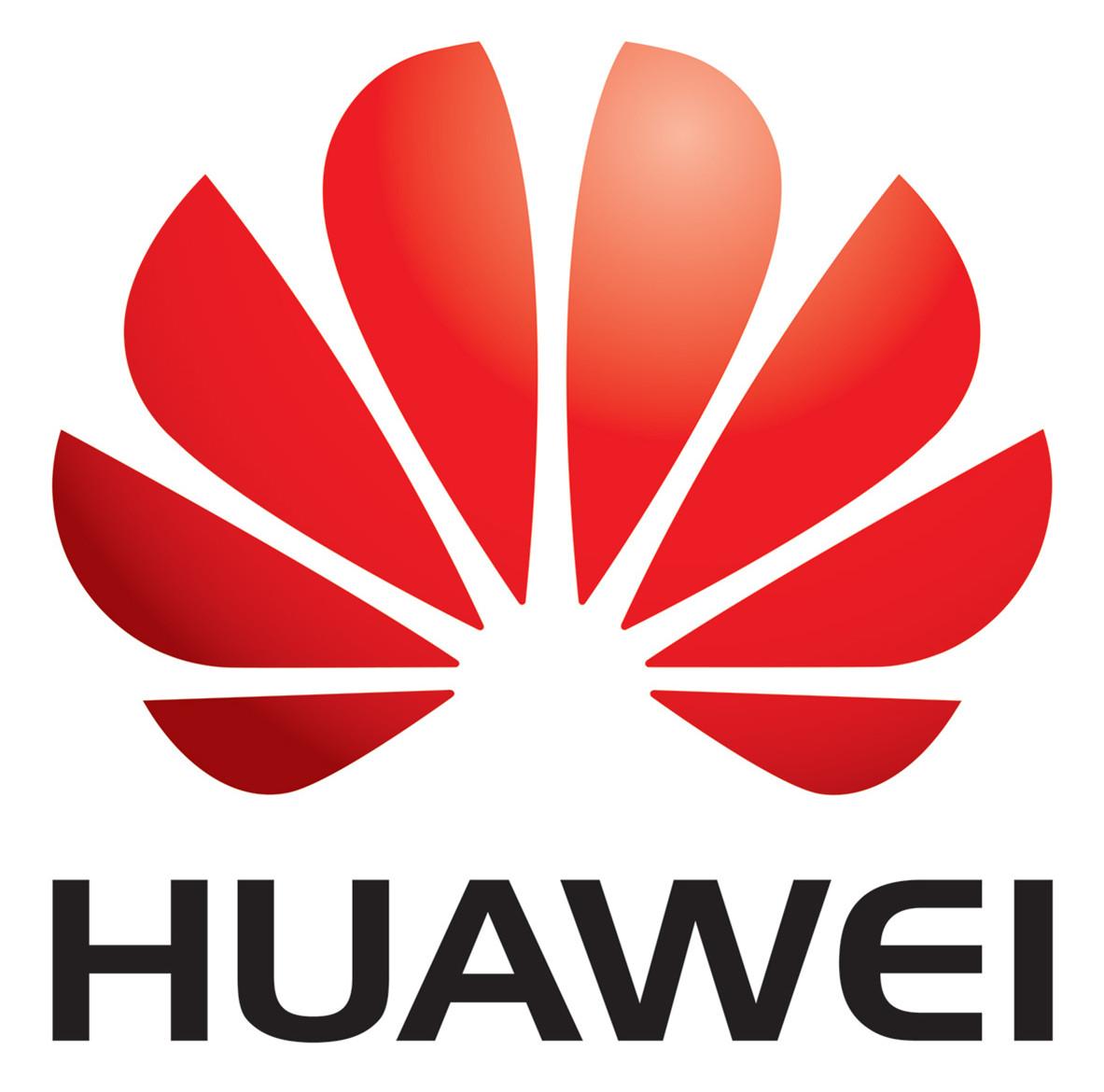
Brand names that use direct pinyin translation: HUAWEI
Why Pinyin?
华为(Huawei) has the particularity of being a brand that has an easily pronounceable and readable literal pinyin translation. The brand is incredibly successful in China and has established a certain level of brand awareness globally. As a result, keeping its phonetic origin abroad increases Huawei’s brand recognition. Moreover, Huawei has chosen to follow the trend of using its original phonetic spelling like other successful technology brands such as Toshiba, Samsung, and Nintendo. By keeping its original name, Huawei intends to maintain a globally unified group, as well as avoid disparities and an undifferentiated brand image.
However, it is important to note that reaching out to the global audience involves adapting the brand name to its targeted consumers. Asian phonetics occasionally trigger reading and pronunciation problems to individuals in the western world. Thus, it is important to test a brand name globally through services such as The Brand Checker, an online tool for screening brand names internationally in local languages and dialects to avoid similarity with existing brands or words, undesirable meanings, negative associations or pronunciation problems.
Sina (新浪) was established in 1998 and has been one of the most influential web-based media companies in China and among overseas Chinese communities. Sina Corporation went public on the NASDAQ in 1999. Ever since then, the company has begun to expand its online service offerings. As one of the most visited websites in China domestically, Sina has successfully built the most popular Chinese micro-blogging site– Weibo.com– which has over 500 million registered users. Many eminent figures worldwide have verified accounts on Weibo, including IMF (International Monetary Fund) President Christine Lagarde, former Microsoft CEO Bill Gates, and Hollywood movie star Tom Cruise. Many international companies are also using verified Weibo Business Accounts, with the goal to leverage the enormous Chinese user base.
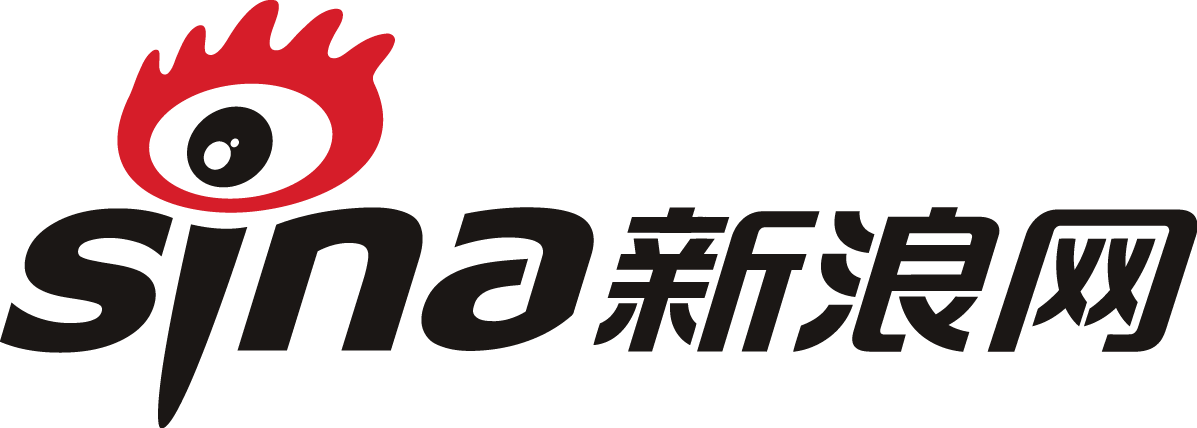
Brand names that use English-friendly phonetic: sina
Why English-friendly phonetic?
Pinyin is an English Romanization of the Chinese language; however in some cases specific words may vary and cause confusion. Sina’s Chinese name 新浪 [xīn làng] is not necessarily an easy name for English speakers. Its English name is adaptable to western phonics given that it is easy to pronounce and memorize. Created more than a decade ago, the name still remains highly relevant and meaningful. The word “Sina” has its origin from “sino”, which is the Latin word for China. With a little twist, Sina smartly conveys the connotation of being a portal that focuses on everything related to China. As more and more foreigners start to use Sina’s services, it is crucial to have a name that speaks out what the company does in this increasingly competitive industry.
Sina started to offer the English version of its iPhone Weibo App in April 2011 as a response to the growing number of international users of its micro-blogging site. Sina’s spokesman also announced in June 2011 that the company plans to launch the English Weibo.com site. Two months later, Sina released its Weibo ad in Times Square with the tagline “Share happiness with (then) 200 million people here”. These actions all indicate Sina’s ambitions to cater to the global audience. In this process, the name Sina would give the company some unparalleled advantages that others in the industry do not have.
BYD is a Chinese automobile manufacturer based in Shenzhen and is an abbreviation of “Build Your Dream”. The firm was established in 2003 and is part of a rechargeable battery company BYD Co. Ltd.. In 2010 the company’s sales skyrocketed, making the company the sixth largest Chinese carmaker by units sold. In 2008 BYD began selling its first mass-produced, full hybrid vehicle. While most of the sales are domestic, some models are exported to developing countries. In late December 2008, Warren Buffet spent 230 million US dollars buying a 10% stake in the Chinese company. Having established its US headquarters in Los Angeles in 2013 and constantly supplied pure-electric buses for the Los Angeles Department of Transportation, BYD is planning to enter the US market albeit some false starts.
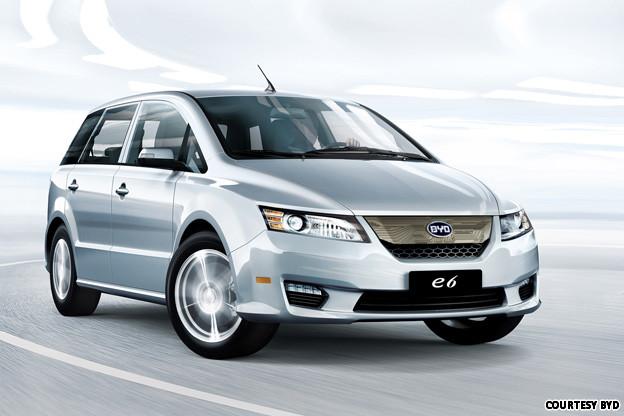
Brand names that use abbreviation: BYD
Why abbreviation?
Name abbreviations appear to be a feasible alternative in the realms of the automotive industry. Abbreviations are very easy for the memorizing, which is one of the reasons why naming experts sometimes recommend this alternative. German luxury car producer BMW is an excellent example of a brand that has used name abbreviations as a way to appeal to foreign and local markets. Abbreviations are also very common within the luxury goods market. Louis Vuitton is a highly demanded luxury French brand in China. However the company does not have an official Chinese name and is recognized in China as simply LV. It is always important to reach out to the global audience. Using abbreviation is a versatile way to reach out to international markets without having to go through the name changing process.
Currently, using English friendly phonetic names like Sina or Geely is the most popular form of English naming. Using abbreviations is limited to specific industries such as luxury goods, automotive and electronics. Subsequently, semantic translation is prevalent within the service industry as some of these brands are corporate owned and must maintain an authoritative image, examples including China Mobile or Air China.
With China’s fast booming economy, many Chinese brands are preparing themselves to enter the international market. Before, the registration process was simple and straightforward. The trend was simply to register their Pinyin as their English name. However, as brands become more global, their representatives understand the need to adopt a name that foreign individuals can pronounce.
In order to appeal to customers on a global scale, Chinese companies have to thoroughly analyze phonetic similarities, as well as the usage of Pinyin in their brand naming process. A name that is globally recognized and appealing will be highly important in determining a company’s success.
A Labbrand Group Company © 2005-2024 Labbrand All rights reserved
沪ICP备17001253号-3* Will be used in accordance with our Privacy Policy
To improve your experience, we use cookies to provide social media features, offer you content that targets your particular interests, and analyse the performance of our advertising campaigns. By clicking on “Accept” you consent to all cookies. You also have the option to click “Reject” to limit the use of certain types of cookies. Please be aware that rejecting cookies may affect your website browsing experience and limit the use of some personalised features.